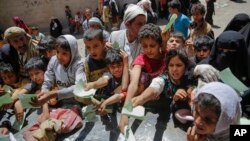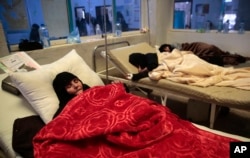The United Nations is demanding that journalists be allowed into Yemen after the Saudi-led coalition fighting Houthi rebels refused to allow a plane carrying three BBC reporters to land.
The reporters were on a U.N. aid flight that was supposed to go to the capital, Sana'a, on Tuesday but was grounded in Djibouti because the journalists were on board.
"Steps like this do not help. This has been a large, man-made humanitarian problem. The world needs to know and journalists need to have access," U.N. spokesman Farhan Haq said Wednesday.
He said incidents like the grounding of the flight explained why one of the world's worst humanitarian disasters was not getting enough attention from the international community.
Haq said the aid flight that was not allowed to fly Tuesday was given permission to land Wednesday in Yemen, but without the BBC reporters.
The Saudis reportedly told U.N. officials they could not guarantee the safety of the BBC crew.
The Saudi-led coalition controls the airspace over Yemen. It is fighting the Iranian-backed Houthi rebels both from the air and on the ground.
The rebels seized Sana'a in 2015, forcing the internationally recognized Yemeni government into exile to Saudi Arabia. It later returned to the Yemeni port of Aden.
U.N. officials say 80 percent of Yemen's population is in desperate need of food, clean water and medical care. A cholera outbreak has killed more than 1,700 people since April, with more than 320,000 suspected cases.
U.N. refugee officials said they were "deeply shocked and saddened" by the latest reports of civilians killed by an airstrike in Yemen's Taizz region.
At least 20 people were killed in Tuesday's attack. Most were from the same family, and all were people who had been driven from their homes because of the fighting.






